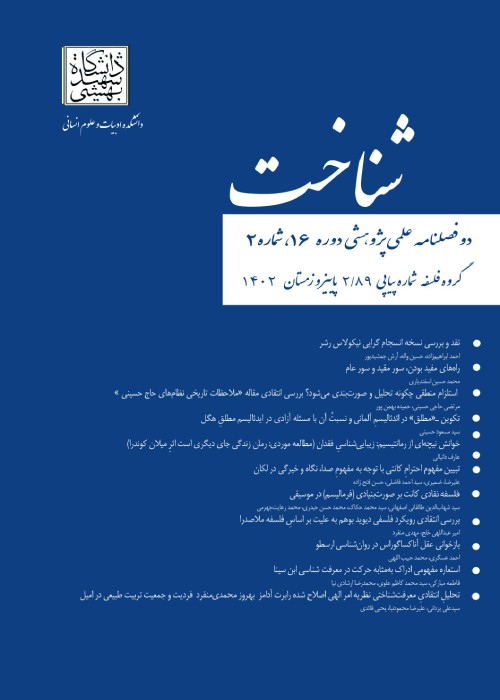Weakness of Will (Acracy): Contemporary Challenges around Meaning
Author(s):
Article Type:
Research/Original Article (دارای رتبه معتبر)
Abstract:
In contemporary philosophical literature, acting against one's better (all things considered) judgment is referred to as akrasia as well as "weakness of will". But the possibility of such an action and the way one can explain this possibility, is debatable. However, the debate has gone further and the very definition of the term "weakness of will" appears to be questionable. Richard Holton, claimed that when we look at discussions on "weakness of will", we see something other than what is supposed to be. He continues that common sense takes "weakness of will" to be something other than acting against one's better judgment. According to Holton, people attribute "weakness of will" to over-readily revising a resolution and failure to act on one's intention. He argues that philosophical debate is on akrasia (acting against one's better judgment) rather than weakness of will and there is a misconception here. Since he declares something about common sense, his claim would be experimentally falsifiable. Alfred Mele tried to examine the Holton's claim using the methods of experimental philosophy. Finally, Mele found that neither Holton nor the philosophical literature is correct. He proposed a disjunctive model for the attribution of 'weakness of will'. Then Holton and May criticized Mele's model and proposed a new model based on various experiments. Since then there is an ongoing debate on this issue. In this article I try to make a critical review of this current debate and to examine why Holton made such a claim, what are the implications of claiming that? Finally I propose a Hybrid model which covers the findings of experiments and reserves the importance of classical problem of "weakness of will" (i.e. the explanation of such an action) as discussed by philosophers.
Keywords:
Language:
Persian
Published:
Journal of Recognition, Volume:10 Issue: 1, 2017
Pages:
223 to 250
magiran.com/p1960447
دانلود و مطالعه متن این مقاله با یکی از روشهای زیر امکان پذیر است:
اشتراک شخصی
با عضویت و پرداخت آنلاین حق اشتراک یکساله به مبلغ 1,390,000ريال میتوانید 70 عنوان مطلب دانلود کنید!
اشتراک سازمانی
به کتابخانه دانشگاه یا محل کار خود پیشنهاد کنید تا اشتراک سازمانی این پایگاه را برای دسترسی نامحدود همه کاربران به متن مطالب تهیه نمایند!
توجه!
- حق عضویت دریافتی صرف حمایت از نشریات عضو و نگهداری، تکمیل و توسعه مگیران میشود.
- پرداخت حق اشتراک و دانلود مقالات اجازه بازنشر آن در سایر رسانههای چاپی و دیجیتال را به کاربر نمیدهد.
دسترسی سراسری کاربران دانشگاه پیام نور!
اعضای هیئت علمی و دانشجویان دانشگاه پیام نور در سراسر کشور، در صورت ثبت نام با ایمیل دانشگاهی، تا پایان فروردین ماه 1403 به مقالات سایت دسترسی خواهند داشت!
In order to view content subscription is required
Personal subscription
Subscribe magiran.com for 70 € euros via PayPal and download 70 articles during a year.
Organization subscription
Please contact us to subscribe your university or library for unlimited access!


